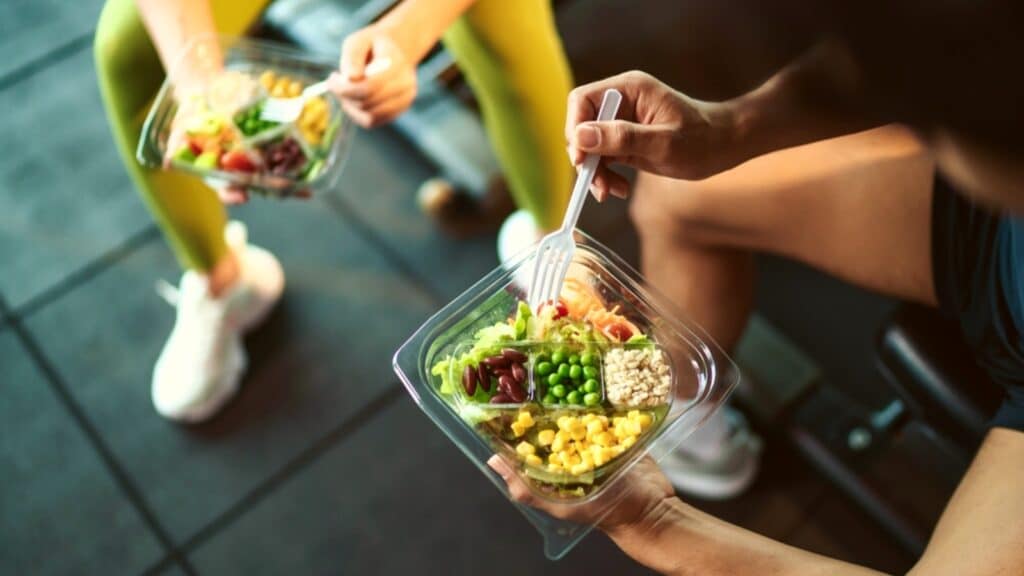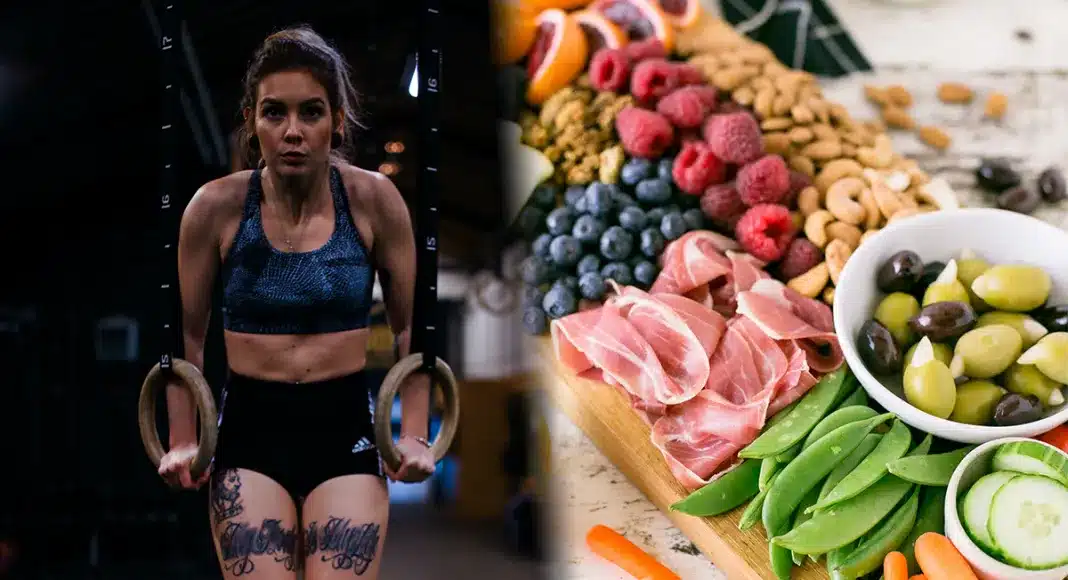Introduction
What Do Crossfit Athletes Eat: CrossFit athletes are known for their exceptional strength, agility, and endurance, but their success in the sport goes beyond rigorous training alone. Nutrition plays a pivotal role in their performance, recovery, and overall well-being. The dietary habits of CrossFit athletes are carefully tailored to support their demanding workouts and competitive aspirations. In this exploration, we will delve into the intriguing world of what CrossFit athletes eat and how their nutritional choices fuel their relentless pursuit of fitness excellence.
At the core of a CrossFit athlete’s diet is the principle of balance. These individuals understand that achieving peak performance requires a harmonious blend of macronutrients, micronutrients, and hydration. Protein, the building block of muscle, takes center stage in their diets, helping to repair and grow the lean mass essential for strength and power. Lean meats like chicken, turkey, and lean cuts of beef, as well as plant-based sources such as tofu and legumes, provide the necessary protein.
Carbohydrates are the primary source of energy for CrossFit athletes. They rely on complex carbs like sweet potatoes, brown rice, and quinoa to sustain them through high-intensity workouts and grueling WODs (Workout of the Day). Healthy fats, obtained from avocados, nuts, and olive oil, play a crucial role in joint health and overall energy. Incorporating a variety of colorful fruits and vegetables ensures that CrossFit athletes receive the essential vitamins, minerals, and antioxidants required for optimal health and performance. Hydration is also paramount, and many athletes emphasize the importance of adequate water intake to prevent dehydration and muscle cramps.

What do CrossFit athletes eat in a day?
As a general guide, the CrossFit website recommends that athletes “eat meat and vegetables, nuts and seeds, some fruit, little starch and no sugar” and “keep intake to levels that will support exercise but not body fat.”
Pre-Workout Nutrition: Before a workout, athletes typically consume a balanced meal rich in carbohydrates and protein. This meal should be consumed 1-2 hours before the training session to provide ample energy.
Intra-Workout Fueling: For particularly intense or long workouts, some athletes may use intra-workout supplements like electrolyte drinks, energy gels, or protein shakes to sustain their energy levels.
Post-Workout Recovery: After a grueling CrossFit session, athletes prioritize post-workout nutrition to aid muscle recovery. This usually involves a protein-rich meal or shake to kickstart the repair process.
Regular Meals: Athletes maintain a regular eating schedule with balanced meals and snacks throughout the day. This helps to keep their energy levels stable and supports their nutritional needs.
How much should a CrossFit athlete eat?
Experienced CrossFitters who train for a couple of hours more than five times a week may need between 400 and 1,500 grams of carbs and 85 to 300 grams of protein each day. CrossFit athletes might want to invest in additional supplements to further optimize their performance.
CrossFit Intensity: The more intense the workouts, the higher the calorie expenditure. Athletes engaging in multiple high-intensity sessions per week will need more calories to support their activity.
Training Volume: Athletes who participate in longer training sessions or more frequent workouts will have higher calorie requirements.
Additional Activities: Some CrossFit athletes engage in other physical activities, such as running, swimming, or sports, which further increase calorie needs.
Weight Maintenance: Athletes looking to maintain their current weight should aim to consume the number of calories that balance their energy expenditure.
Weight Gain: Athletes seeking muscle growth or increased body weight should consume a surplus of calories, typically by adding more protein and healthy fats to their diet.
Weight Loss: Athletes aiming to lose body fat should create a calorie deficit, either through dietary changes or increased physical activity. However, this should be done under the guidance of a nutritionist or coach to avoid compromising performance.
What does Usain Bolt eat everyday?
At lunch , Bolt opts for a good portion of protein, preferably fish, accompanied by a portion of rice or pasta and one of whole wheat bread and plenty of vegetables. Between meals Bolt claims to be a heavy consumer of bananas, mangoes, pineapples and apples.
Complex Carbohydrates: Usain Bolt starts his day with a hearty breakfast consisting of complex carbohydrates such as whole grains, oats, or whole wheat bread. These carbohydrates provide a sustained source of energy for his training sessions.
Protein: To support muscle recovery and growth, Bolt includes a source of lean protein in his breakfast, often opting for eggs or lean meats like chicken or turkey.
Fruits: Bolt incorporates fresh fruits like bananas, berries, or oranges, which are rich in vitamins, minerals, and antioxidants, helping to boost his immune system and overall health.
Hydration: Proper hydration is a priority for Bolt, so he begins his day with water or a hydrating beverage like coconut water.
Do Crossfitters train full body everyday?
While CrossFit workouts can be performed daily, it’s not generally recommended. You can expect to do your CrossFit training around two to five days a week.
Metcon (Metabolic Conditioning): These workouts involve high-intensity exercises that engage multiple muscle groups. Examples include AMRAPs (As Many Rounds As Possible) and EMOMs (Every Minute on the Minute).
Strength Training: CrossFit incorporates weightlifting exercises like squats, deadlifts, and presses to build strength. Athletes often have dedicated strength training days.
Skill Work: CrossFit athletes work on mastering various skills, such as pull-ups, handstand push-ups, and rope climbs, which require full-body engagement.
Cardiovascular Conditioning: Running, rowing, and cycling are integrated into CrossFit workouts to improve endurance and cardiovascular health.
Rest and Recovery: CrossFit programs include rest days to allow muscles to recover and prevent overtraining. Recovery is an essential part of the training process.
Do CrossFitters eat rice?
Food for Crossfitters: Macro
The Macro way of eating includes protein, carbohydrates and fats. Protein helps to build your body and your muscles. Carbohydrates are your fuel. Stick with low GI carbs (brown bread, quinoa, brown rice etc) instead of processed white bread, fries or cereals.
White Rice: White rice is often chosen by CrossFitters for its quick digestibility and ability to provide rapid energy. It’s a suitable option for pre-workout meals to fuel intense training sessions.
Brown Rice: Brown rice is less processed than white rice, retaining its bran and germ layers, which offer more fiber, vitamins, and minerals. CrossFitters who prioritize whole foods and slower-releasing energy may opt for brown rice in their diets.
Wild Rice: Wild rice, although not a true rice variety, is a nutrient-rich option with a distinct nutty flavor. It’s appreciated for its higher protein content and can be included in post-workout meals for recovery.
Cauliflower Rice: Some CrossFit athletes who follow low-carb or paleo diets may substitute traditional rice with cauliflower rice, a lower-carb alternative.
Is rice good for CrossFit?
Similar to weight loss, caloric intake is the most important factor when it comes to gaining muscle mass. However, quality carbohydrates from foods like rice can support muscle-building efforts a few different ways. Higher carb intake typically supports more glycogen storage in muscles, which helps fuel your workouts.
Carbohydrate Source: CrossFit relies heavily on carbohydrates for energy. Rice, whether it’s white, brown, or wild, is a rich source of carbohydrates. These complex carbohydrates provide a steady release of energy, making them ideal for CrossFit athletes who need endurance during their workouts.
Digestibility: Rice is easily digested, making it a great choice for pre-workout meals. It’s less likely to cause digestive discomfort during high-intensity training sessions compared to heavy, slow-digesting foods.
Calorie Density: CrossFit athletes often need to maintain or even increase their calorie intake to support their training demands. Rice can be a calorie-dense option, allowing athletes to meet their energy needs efficiently.
Versatility: Rice can be incorporated into a variety of dishes, offering flexibility in meal planning for CrossFitters. It pairs well with lean protein sources, vegetables, and sauces, allowing athletes to create balanced, satisfying meals.
Recovery: After a challenging CrossFit workout, refueling with carbohydrates is crucial for replenishing glycogen stores in muscles. Rice, especially when combined with protein, can contribute to effective post-workout recovery.
Are bananas good for CrossFit?
Bananas are rich in nutrients like carbs and potassium, both of which are important for exercise performance and muscle growth. They’re also easy to digest and can slow the absorption of sugar in the bloodstream, making bananas a great snack option before your next workout.
Rich in Carbohydrates: Bananas are a fantastic source of carbohydrates, specifically natural sugars like glucose, fructose, and sucrose. These sugars provide a quick and easily digestible source of energy, making bananas an ideal pre-workout snack to fuel CrossFit sessions.
Potassium Content: Bananas are famous for their potassium content. Potassium is an essential electrolyte that plays a critical role in muscle function, nerve transmission, and fluid balance. CrossFit athletes often sweat heavily during intense workouts, leading to potassium loss. Consuming bananas can help replenish this vital mineral.
Digestibility: Bananas are easy on the stomach and are unlikely to cause digestive discomfort during high-intensity workouts. Their soft texture and mild flavor make them a convenient and gentle option before or after training.
Natural Sugars: While bananas contain natural sugars, they also provide dietary fiber, which helps regulate blood sugar levels and prevents energy spikes and crashes. This balance of sugars and fiber is beneficial for maintaining steady energy levels during CrossFit workouts.
Nutrient Density: Carbohydrates and potassium, bananas contain essential vitamins and minerals like vitamin C, vitamin B6, and manganese. These micronutrients contribute to overall health and may aid in muscle recovery.
How do I fuel my body for CrossFit?
The CrossFit nutrition plan based on the Zone Diet suggests 40% carbohydrate, 30% protein, and 30% fat. This macro split is thought to provide enough carbohydrates to fuel intense workouts, enough protein to maintain and build lean muscle mass, and the necessary fats to support the nervous and hormonal systems.
Carbohydrates for Energy:Carbohydrates are your body’s primary source of energy, especially during high-intensity activities like CrossFit. Ensure that your diet includes complex carbohydrates such as whole grains, brown rice, quinoa, sweet potatoes, and oats. These slow-releasing carbohydrates provide sustained energy throughout your workouts.
Protein for Muscle Repair:Protein is crucial for muscle repair and growth, making it a key component of a CrossFit athlete’s diet. Include lean protein sources like chicken, turkey, fish, lean beef, eggs, dairy, tofu, and legumes. Aim for a balance of protein in each meal to support recovery.
Healthy Fats for Sustained Energy:Healthy fats like avocados, nuts, seeds, and olive oil provide a steady source of energy and support overall health. Incorporate these fats into your diet, but be mindful of portion sizes as they are calorie-dense.
Hydration Is Key:Proper hydration is essential for peak performance. Dehydration can lead to fatigue, cramping, and decreased workout effectiveness. Drink water throughout the day, and consider including electrolyte-rich beverages like sports drinks or coconut water, especially during longer or more intense workouts.

Conclusion
Protein, the cornerstone of muscle repair and growth, remains a central component of their diet. Whether sourced from lean meats or plant-based options, it provides the necessary building blocks for strength and power. Carbohydrates, especially complex varieties, are essential for sustaining energy levels during high-intensity workouts, and CrossFit athletes rely on them to power through their demanding training regimens.
The inclusion of a rainbow of fruits and vegetables in their diets underscores the importance of obtaining a broad spectrum of vitamins, minerals, and antioxidants. This not only supports their physical health but also aids in recovery and immune system function. Additionally, the incorporation of healthy fats ensures joint health and provides long-lasting energy. Meal timing is another crucial element in the dietary playbook of CrossFit athletes. They strategically plan their pre-workout and post-workout meals to optimize energy levels, maximize recovery, and prevent muscle soreness.
Hydration, too, is a non-negotiable aspect of their nutrition, helping to ward off dehydration and cramps during intense workouts.Ultimately, the nutritional choices of CrossFit athletes reflect their commitment to excellence. They understand that the right foods are not only vital for athletic performance but also for overall health and longevity. Through a combination of careful planning, discipline, and an unwavering passion for the sport, these athletes continue to push their limits, demonstrating that success in CrossFit extends far beyond the gym floor.


2 comments
hello there and thank you for your information – I have definitely picked up
something new from right here. I did however expertise several technical
points using this web site, as I experienced to reload the website many times previous to I
could get it to load properly. I had been wondering if your web
host is OK? Not that I’m complaining, but slow loading instances times will often affect your placement
in google and could damage your quality score if advertising
and marketing with Adwords. Anyway I am adding this RSS to my email and could look out for a lot more of your respective intriguing content.
Ensure that you update this again soon.. Escape room lista
I think the admin of this site is in fact working hard for his web site, as here every
data is quality based data.